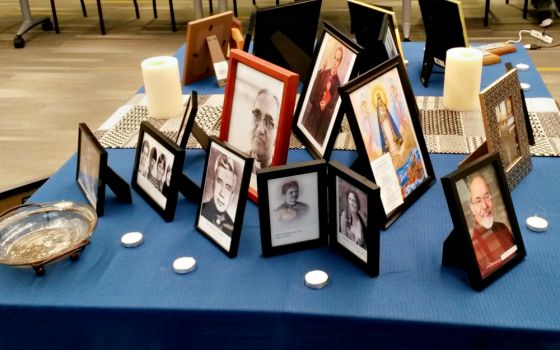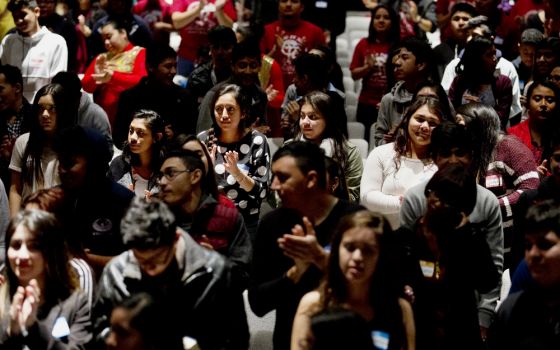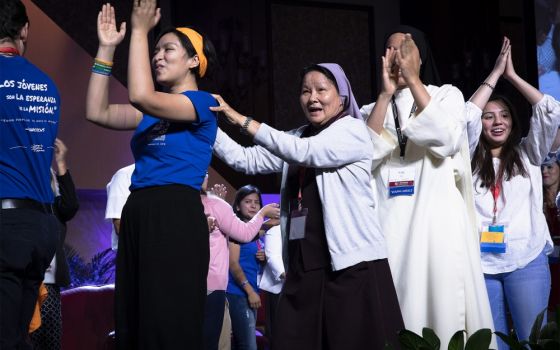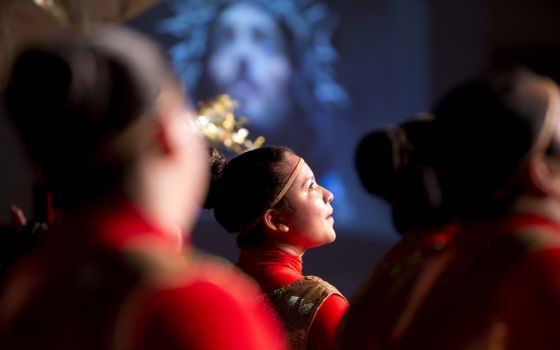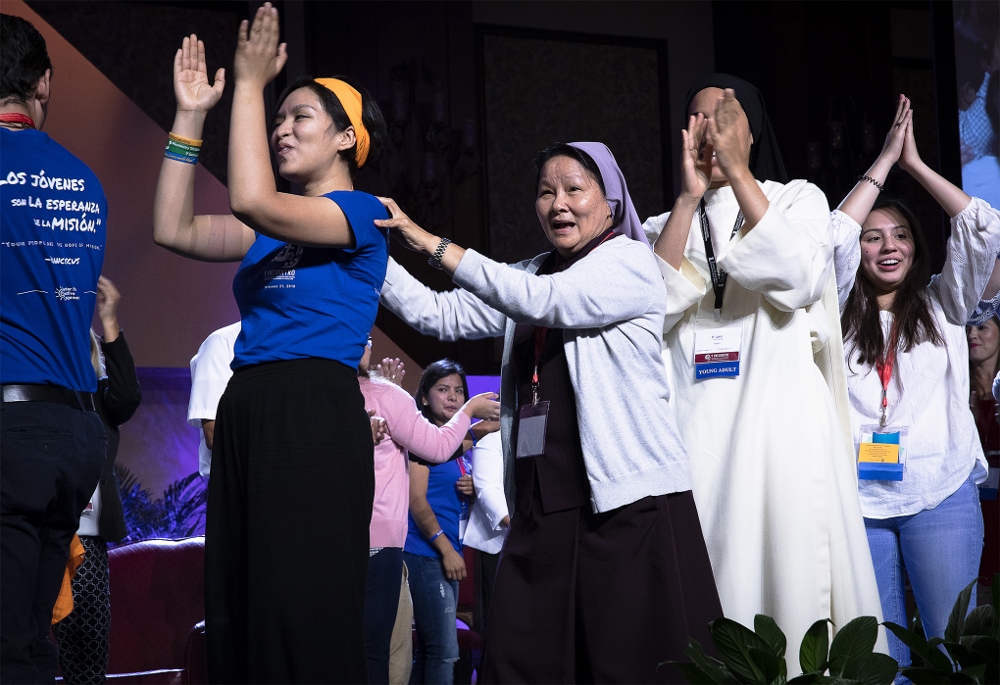
Delegates celebrate the Sept. 23 closing session of the V Encuentro in Grapevine, Texas. (CNS/Tyler Orsburn)
Nuestra alegría está en el servicio; nuestra misión es evangelizar.
Nuestra cultura es del encuentro con nuestro Dios y la humanidad.
Our joy is in service; our mission is evangelization.
Our culture is of encounter with our God and humanity.
The theme song of the V Encuentro, a four-year consultation with Hispanic Catholics, proclaimed that participants are already working to meet their communities' needs and spread their faith.
At the halfway point of the process Sept. 20-23, almost 3,000 delegates met for a national encuentro (Spanish for gathering, or encounter) in Grapevine, Texas, to share concerns and suggestions for strengthening their mission of service and evangelization that had percolated in their parishes, dioceses and regions.
Encuentro speakers, panelists and other participants were emphatic that Latino Catholics are not just a minority group requesting attention to their special needs. Rather, the Encuentro process intended to prepare and organize Latinos for their future as the majority of Catholics — about 60 percent of Catholics under 18 are Latino — while also asserting that Latinos are already the church and have been for centuries.
"I get a little uneasy when I hear people say, 'The Latinos are coming to maturity,' " said panelist Hosffman Ospino, co-chair of the process committee. "Frankly, we've been here for 500 years."
Alejandro Aguilera-Titus, assistant director for Hispanic affairs for the U.S. Conference of Catholic Bishops, which convoked the process, told NCR that, in conversations with bishops since the event, "they see for the first time an expression of the embrace of the key role that Hispanic-Latinos play for the future of the entire church of the U.S. — not only by the numbers, but by who they are and what they bring."
'Full members of the household of God'
Summarizing the event's conclusions, Arturo Chávez, president of the Mexican American Catholic College in San Antonio, said Latinos "don't want to be guests anymore. We want to be full members of the household of God."
But Chávez specified that doesn't mean Latinos are seeking to build their own parallel church or want to be assimilated by English-speaking Catholics. Rather, they are seeking full integration.
"The V Encuentro process has shown clearly that our needs as the Hispanic people are the needs of the church because we are the church," Ospino, director of graduate programs in Hispanic ministry at Boston College School of Theology and Ministry, added during the same panel.
"There aren't two Catholic churches in the United States. ... Our journey, our joys and our sadness, our hopes and frustrations are an integral part of the journey of the church in this country."
'There aren't two Catholic churches in the United States. ... Our journey, our joys and our sadness, our hopes and frustrations are an integral part of the journey of the church in this country.'
—Hosffman Ospino
Jessica Maciel-Hernández, coordinator of Hispanic youth ministry for the Diocese of Des Moines, Iowa, applied the call to integration specifically to young Latinos. Young people are asking "that you give us ownership, that you give us responsibilities," she said.
She listed the three main requests to come out of the national encuentro:
- A pastoral plan for Hispanic leaders;
- Parish-level communities that help bridge the gaps between parents, children and parish leaders;
- More paid positions for those in youth and young adult Hispanic ministry.
She also explained, "It makes a difference when there's a paid Hispanic youth or young adult in a position of ministry. I can see the difference in my parish." Positions need to be paid "because we also want to, you know, live, get an education. ... Please trust us with the work that God has put in our path."
Fr. Michael Tobin from the Archdiocese of Louisville, Kentucky, told NCR that he felt a lot of energy to reorganize ministry and add personnel to ensure every office of his archdiocese is relevant to Hispanics, "in place of just having one, shall we say, token minister to this gigantic Hispanic community."
He added that his "greatest desire is for Hispanic parents to grow in confidence and [in their] ability to communicate well with their own children their faith, instead of leaving it to the English-speaking parents to serve as the catechists for all the Hispanic children."
Advertisement
For others, communication between clergy and parishioners is the biggest issue they hoped to address at the V Encuentro. "I think we need to be listened to more, especially by the priests," said Margarita Jimenez, from the Diocese of San Bernardino, California.
"Throughout this event, I heard different people complaining about the same situation where they are not listened to, they are not understood," she said, adding that her parish priest was uninterested in the V Encuentro, leaving laypeople to carry out the process themselves.
Listening to young people
One of the most significant outcomes of the V Encuentro, national coordinator Aguilera-Titus said, will be "generating new pathways for young adults to be identified, to be trained, to be mentored into formation and into leadership."
Young adults have been at the forefront of the process since its inception, with identifying and supporting youth and young adults as one of its main goals. With 700 young adults attending the national event, those 18-38 years old made up a third of all participants.
Brenda Noriega, a youth ministry coordinator who's on the regional board of Pastoral Juvenil Committee, said on a panel that young people need to be at the table, "but not when the table is already served, because then they can't own it."
"We need to put young people in positions other than just youth and young adult ministry," she added. "We need to put them in every single office, in every single ministry."
The Sept. 21 dinner between bishops and young adults was a chance for the two groups to meet and share obstacles that, from the young adults' perspective, keep them from efficiently doing their ministries. The need for adequate budgets, paid positions, attention and space were recurring themes in their conversations. During prayer at the end of the social gathering, a spontaneous gesture rippled through the room, with young adults laying hands on the bishops' shoulders as they prayed for each other.
Bishop Oscar Cantú of San Jose, California, said, "Listening to the young people fed my soul."
On a panel, Cantú recalled how in many parts of society it was a "liability to be Hispanic" when he was growing up. When he applied to the seminary, he said, a religious sister told him, " 'Oscar, you're bilingual, you know two cultures — you will be a gift to the church.' Sadly and joyfully, that was the first time I ever heard that in my life. May you never forget that you are a blessing to the church."
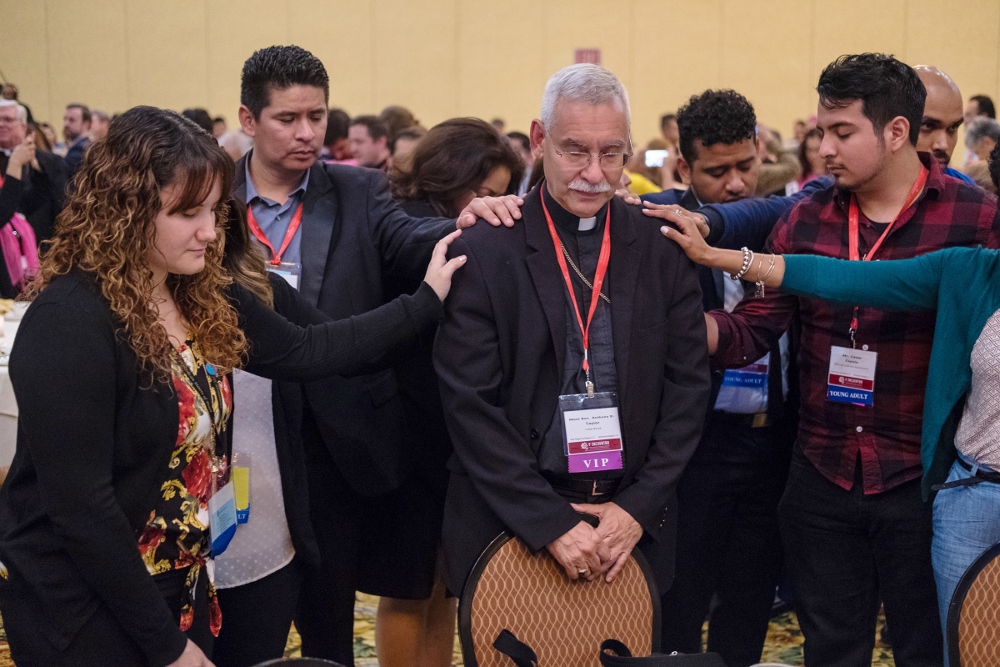
Young Catholic adults pray over Bishop Anthony Taylor of Little Rock, Arkansas, Sept. 21 during an evening encounter between young adults and their bishops at the V Encuentro in Grapevine, Texas. The dinner brought together more than 700 Catholic young adults and a cross section of the 150 bishops attending the national event. (CNS/Texas Catholic Herald/James Ramos)
Tobin, the priest from the Louisville Archdiocese, said that now is the time for "gray-hairs" in ministry to welcome the young adults, "give them responsibility, train them with what we've learned and then get out of their way."
"They are the church now," he said. "But they're certainly going to be the church when we've retired."
Canada also saw the V Encuentro as an opportunity to lean into the future of the church, in this case to learn how to minister to Latinos and migrants, who are coming in waves, said Auxiliary Bishop Joseph Dabrowski of London, Ontario.
He attended the event on behalf of his diocese "to learn what's happening in the States and how we can offer support, specifically to Latinos and Hispanics," he said, coming from a diocese with almost 15,000 seasonal migrants.
"We want to learn because you already have such a rich experience," he said of the U.S. church.
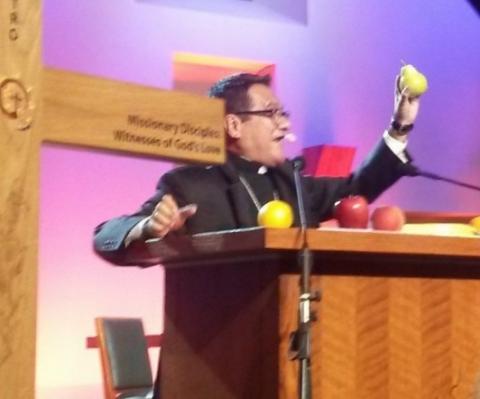
Detroit Auxiliary Bishop Arturo Cepeda holds up a pear he was given during a keynote address Sept. 22 at the V Encuentro in Grapevine, Texas. (NCR photo/Maria Benevento)
Bearing fruit
When Detroit Auxiliary Bishop Arturo Cepeda told the V Encuentro crowd to bear fruit, he may have ended up with more than he bargained for — specifically a peach, a pear, two bananas, red and green apples, an orange and a tangerine.
A handful of participants approached the podium one by one with fruit, which most had likely stashed away after a recent snack break, after Cepeda made a comment about fruits multiplying.
The spontaneous and humorous display of enthusiasm was referenced throughout the rest of the weekend as representative of V Encuentro participants' readiness to take what they learned at the encuentro and put it into action in their home parishes, making the lessons "bear fruit."
"We saw yesterday what one can do by just mentioning fruit," Bishop Gerald Barnes* of San Bernardino, California, joked. He told the participants that the bishops have "heard your dreams, we've seen your tears, and we recognize your willingness to be missionary disciples. ... We have seen what can happen. We go back home, and we go fortified."
He also summarized the lessons the bishops were taking home based on what they'd heard from participants throughout the V Encuentro.
"You're asking us to be accessible. Not to intimidate you. Not to keep you on the sidelines. To support you, even in our budgets," Barnes said.
"My brother bishops, our people are ready for leadership. They are already leaders. We must place them in leadership positions in all levels of the church even as we strengthen our programs of leadership training and formation. We must show by our accompaniment that we also love our people and we must affirm them."
Laypeople at the event were also eager to apply the lessons they'd learned. "We have a responsibility to go back to our church and start working," said María Campos, a participant from San Diego. "How can we involve people to come into our church? Or the young people, how do we convince them to come and help others and start to change everything? It's really interesting to start working and I'm getting ideas how to do it."
Passionist Sr. María Clareth Chavarria Porras from Lansing, Michigan, an immigrant from Costa Rica, said that Latinos need to commit themselves more and encounter others "as Pope Francis has challenged us to do, not to stay home but to continue walking with others to give the best of ourselves."
"The encuentro overall has been a richness for the church," she added. "Now it's up to us to work so that this truly bears fruit in the way we hope it does."
The number of recommendations from the breakout sessions was overwhelming but also exciting, Aguilera-Titus said.
"The Hispanic-Latino Catholic community is ready to provide leadership for the life and mission of the church," he said adding that he senses an embrace of that leadership from Catholics, including bishops and other church leaders.
"It is a mutual embrace; remember that the true goal of the V Encuentro was, on one hand, to strengthen the pastoral response to the Hispanic presence, but also for Hispanic-Latinos to offer their leadership in the service of the entire church of the U.S. That two-way street — I felt it and I saw it, more palpable than ever before."
*An earlier version of this story misidentified Bishop Gerald Barnes.
[Soli Salgado is a staff writer for Global Sisters Report. Maria Benevento is an NCR Bertelsen intern. Follow them on Twitter @soli_salgado and @mariafbenevento.]






